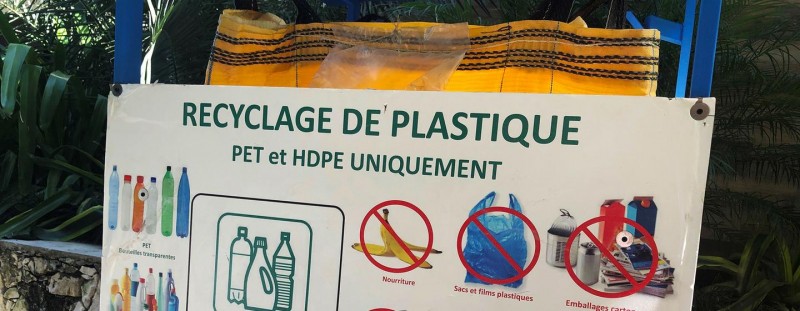Contents
A plastic recycling collection point in Port-au-Prince, Haiti. The unsafe migration of people from Haiti could be reduced by a recycling initiative which is aimed at tackling environmental degradation. The initiative, launched by the UN’s International Organization for Migration (IOM), will not only help to improve the environment, it may also provide new housing which is resilient to natural disasters. On the International Day of Migrants, celebrated annually on 18 December, UN Haiti looks at how recycling could make a contribution towards people staying at home rather than risking migration through unofficial or irregular channels. One of the causes of Haitians wanting to leave their country is the degradation of the environment, including deforestation and soil erosion. This means that many people can no longer sustain a living where they are and are falling deeper into poverty. This is especially true in rural areas. This degradation deepens the threat of natural disasters like hurricanes, flooding, drought and earthquakes which Haiti is particularly susceptible to. This combination of factors is making people even more vulnerable, especially when they are not able to access jobs or basic services like health care and education. Research shows that when people are more vulnerable, especially as a result of natural disasters, they are more likely to migrate in search of more safety and ultimately a better life. Recycled plastic could be used to build more earthquake resistant structures. Recycled plastic could be used to build more earthquake resistant structures. Haiti’s natural environment has been under pressure for some time; soil erosion and landslides linked to deforestation, increased pollution and waste as a result of urbanization and a series of natural disasters have all led to the deterioration of the environment. The effects of climate change are exacerbating the current situation. These conditions weaken the country, leading to food insecurity and increased migration. Waste management remains very rudimentary in Haiti and much worse than other countries in the region. Recycling is one initiative to reduce waste and improve the environment and brings a number of benefits, even if only on a limited scale. Waste management in Haiti lags far behind other countries in the region. An increasing number of migrants are leaving Haiti for a variety of reasons. Poverty and economic factors including the lack of jobs and opportunities are playing a significant role, but security-related concerns, especially in the capital Port-au-Prince, are also significant. The August 2021 earthquake and other broadly climate-related stresses are other factors driving people from their homes. Migration isn’t a problem in itself; the concern is that many of the people who are leaving are amongst the poorest and most vulnerable. They are more likely to migrate in unofficial or irregular ways, for example by sea, which can often be more dangerous than planned migration. Plastic pollution harms the environment in Haiti. Plastic recycling presents a number of benefits including a cleaner, less polluted and thus healthier environment. In addition, recycling creates jobs, which gives people a reason to remain where they are. The IOM project in partnership with the Haitian government and recycling organizations, is looking to multiply the benefits of recycling. It will do this by developing an innovative and sustainable construction material from the plastic waste which could be used to build houses which are more resistant to extreme weather like hurricanes and floods as well as catastrophic natural disasters such as earthquakes. Reducing the risk of disasters will mean that fewer people are affected in a time of crisis, so they are less likely to be displaced from their homes and may not consider migrating. Recycling is one small part of a range of interventions which can halt environmental degradation and contribute to the slowing down of irregular and unsafe migration. The project could be very useful in conjunction with other aspects of an environmental and climate action agenda, including reforestation, sustainable energy production and a circular economy where material considered as waste is reused rather than disposed of.What is the link between Haiti’s environment and migration?

Why is Haiti’s environment degraded?

Why are people leaving Haiti?

How can plastic recycling help?
Are there other links between migration and the environment?



